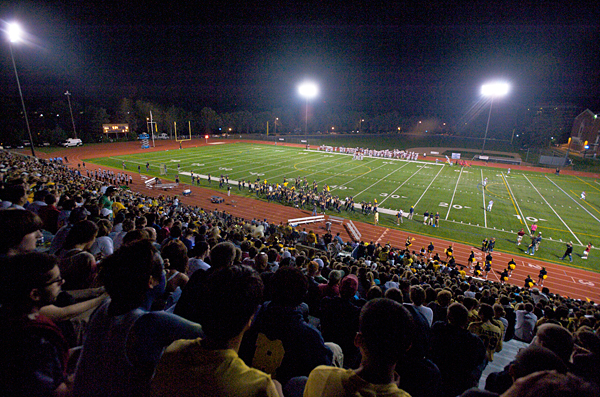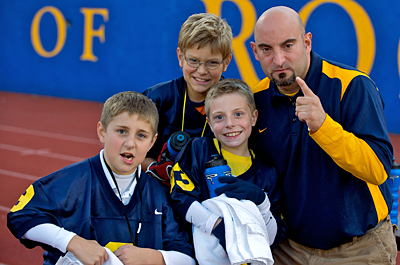Growing up in the Buffalo area, Tom Malczewski ’08 had heard about Camp Good Days and Special Times, a recreation center headquartered in Mendon, N.Y. He knew that the camp’s mission was to improve the lives of children with cancer.
 CAPTAINS COURAGEOUS: Honorary captains Jordan Humphrey, Michael Mueller, and Alexander Winterberger (below, from left) get their game faces on with Dan Provenzano, Rochester’s equipment supervisor, as they prepare for the Yellowjackets’ game against St. John Fisher in the Courage Bowl at Fauver Stadium (above).
CAPTAINS COURAGEOUS: Honorary captains Jordan Humphrey, Michael Mueller, and Alexander Winterberger (below, from left) get their game faces on with Dan Provenzano, Rochester’s equipment supervisor, as they prepare for the Yellowjackets’ game against St. John Fisher in the Courage Bowl at Fauver Stadium (above).
But Malczewski was a freshman wide receiver for the Yellowjackets football team when he realized firsthand the impact Camp Good Days has had on its children. During the football team’s preseason practices, Malczewski and his teammates visited the nonprofit camp, where they met many of the kids.
“When you actually get to go to the camp and see what they do, it’s a humbling experience,” says Malczewski, a psychology major. “It puts a picture to what they do. It puts a lot into perspective.”
Getting that perspective has been part of the annual tradition of the Courage Bowl, a yearly football clash between Rochester and crosstown rival St. John Fisher. Ever since that first visit in 2005, players from both teams have traveled to the camp to hang out with the kids.
As part of the activities, six campers—three for each team—are selected to be honorary coaches for the rivalry game. The honorary coaches join the players at their pregame meal, ride the team bus to the game, visit their team’s locker room, and lead the players onto the field, where they participate in the coin toss. They watch the game from the sidelines.
In addition, four Camp Good Days girls are selected to serve as honorary cheerleaders, attending team practices, meeting the squads, and helping lead cheers at the game.
This fall, the campers made the trip to Fauver Stadium, where they, along with a nearly sold-out crowd, watched the Cardinals come from behind to beat the Yellowjackets 24 to 17.
The purpose, says Camp Good Days founder and chairman Gary Mervis, is to provide the children with a unique experience.
“It allows us to give some of our kids a chance to do something they never could have dreamed about,” says Mervis, who has also served as an assistant coach for the Fisher team for 19 years. “For one night, the kids get a chance to see college football up close and personal.”
Mervis says the Courage Bowl, which is broadcast live on radio and TV in the Rochester area, also helps generate publicity for the camp and its mission, which in turns attracts the volunteers who are crucial to the camp’s success.
Although Rochester and Fisher have been battling on the gridiron for years, the game became the Courage Bowl in 2005, when Mervis came up with the idea and pitched it to Fisher coaches and administrators. With the support of the Rochester team and administration, the Courage Bowl was formed.
And while Mervis says the Courage Bowl isn’t primarily a fundraiser, the game generates several thousand dollars a year for the camp and its programs.
Although the Cardinals have won the first four Courage Bowls, those involved say the game’s outcome is not the only priority.
“For the players, it’s still a football game, but it’s certainly more than that,” says George VanderZwaag, director of athletics and recreation at Rochester. “It opens their eyes to those not as fortunate as they are. They really do a great job preparing not only to play football but also to be involved with Camp Good Days and Special Times and be with people who haven’t had the fortune that they have.”
Mervis, whose daughter, Teddi, succumbed to cancer, says the hope is that the students and the campers come away with a new appreciation for what’s important in life.
“When we saw what it meant to the children from Camp Good Days and to the players, it exceeded our expectations,” Mervis says.
The experience has made an impression on Malczewski, who after graduation hopes to become a New York state trooper. He remembers watching a special video created to commemorate the 2007 Courage Bowl.
On the tape, he saw someone become visibly upset with the Yellowjackets’ loss, a reaction that struck the player as misplaced, given the purpose of the game and its goals.
“He could be upset by so much more,” Malczewski says.
Ryan Whirty writes about sports for Rochester Review.
